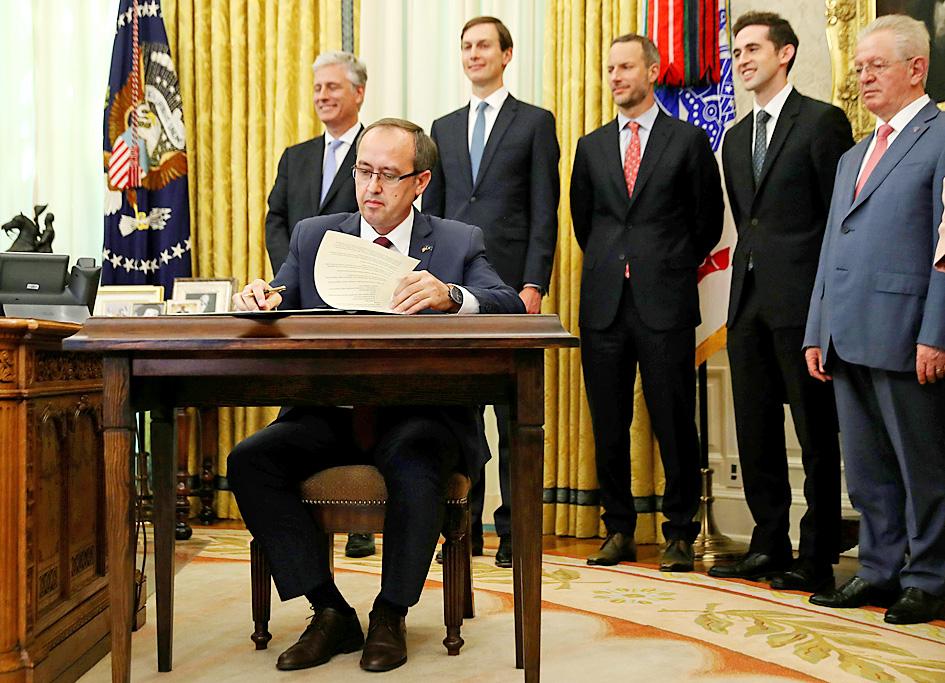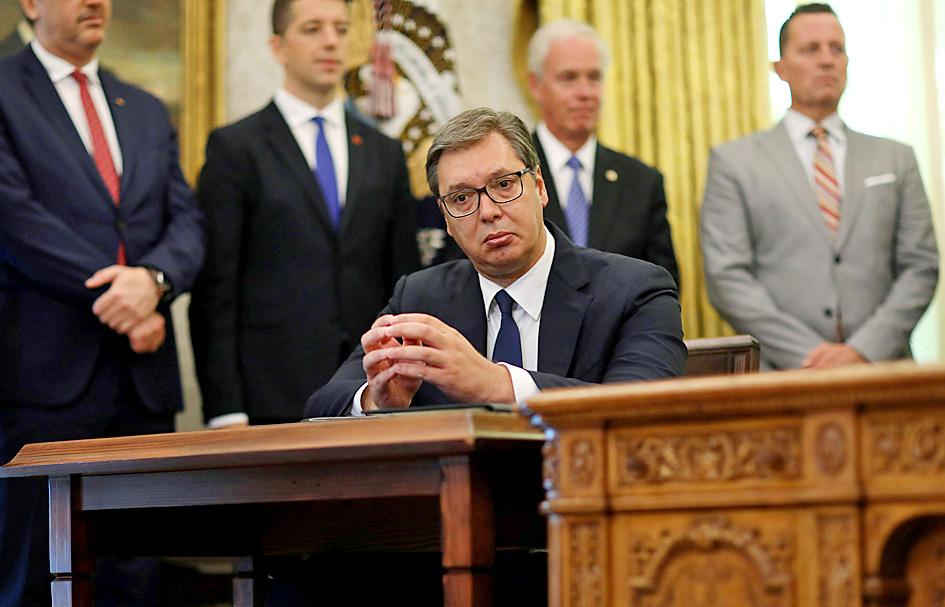Former foes Kosovo and Serbia on Friday agreed to normalize economic relations in a deal brokered by the US, which US President Donald Trump’s administration touted as a major diplomatic success.
The two sides signed a statement in the White House Oval Office committing to a raft of measures to improve transport infrastructure and border crossings, cut trade tariffs, and share energy and water resources, as well as to implement earlier agreements on opening highway and rail links.
They also agreed to improve their relations with Israel. Serbia would move its embassy from Tel Aviv to Jerusalem, while Kosovo, a majority Muslim country, would formally recognize the Jewish state.

Photo: Reuters
In turn, Kosovo, which declared independence from Serbia in 2008, gained formal recognition from Israel.
“A truly historic day,” Trump said, with Kosovar Prime Minister Avdullah Hoti and Serbian President Aleksandar Vucic sitting beside him in the Oval Office. “By focusing on job creation and economic growth, the two countries were able to reach a real breakthrough on economic cooperation across a broad range of issues.”
Trump praised US Special Presidential Envoy for Serbia and Kosovo Peace Negotiations Richard Grenell for bringing the two sides together, two decades after they fought a war that left 13,000 dead.

Photo: Reuters
“It took decades because you didn’t have anybody trying to get it done,” Trump said of the agreement.
“There was a lot of fighting and now there’s a lot of love,” he said. “Economics can bring people together.”
Because they do not formally recognize each other, the two sides appeared to sign parallel statements of intent rather than a formal bilateral agreement, but a Trump administration official stressed that it was a pact between the two sides.
“They have normalized their economic relations,” US National Security Adviser Robert O’Brien said. “The Serbia-Kosovo conflict has gone on for decades. They have been stuck, unable to move forward for many, many years.”
Hoti said that the deal was “a big step” toward the two sides granting each other formal diplomatic recognition.
Serbia has refused to recognize its former territory since Kosovo declared independence.
Although many countries, including the US and European powers, recognize both, Serbian allies China and Russia have withheld their endorsement of the Kosovo state, preventing it from joining the UN.
However, Vucic said that the Serbians had struck a bilateral agreement “with the US,” so that no recognition was given to “third party” Kosovo.
“We will have a common market, no more surprises with the tariffs,” he added.
The agreements include significant help in economic and infrastructure projects from the US Export Import Bank and the International Development Finance Corp.
Hoti put the value of the US support at more than 1 billion euros (US$1.18 billion).
“There is a clear commitment from President Trump and his administration that all these projects begin to be implemented within a year,” Hoti said.

The CIA has a message for Chinese government officials worried about their place in Chinese President Xi Jinping’s (習近平) government: Come work with us. The agency released two Mandarin-language videos on social media on Thursday inviting disgruntled officials to contact the CIA. The recruitment videos posted on YouTube and X racked up more than 5 million views combined in their first day. The outreach comes as CIA Director John Ratcliffe has vowed to boost the agency’s use of intelligence from human sources and its focus on China, which has recently targeted US officials with its own espionage operations. The videos are “aimed at

STEADFAST FRIEND: The bills encourage increased Taiwan-US engagement and address China’s distortion of UN Resolution 2758 to isolate Taiwan internationally The Presidential Office yesterday thanked the US House of Representatives for unanimously passing two Taiwan-related bills highlighting its solid support for Taiwan’s democracy and global participation, and for deepening bilateral relations. One of the bills, the Taiwan Assurance Implementation Act, requires the US Department of State to periodically review its guidelines for engagement with Taiwan, and report to the US Congress on the guidelines and plans to lift self-imposed limitations on US-Taiwan engagement. The other bill is the Taiwan International Solidarity Act, which clarifies that UN Resolution 2758 does not address the issue of the representation of Taiwan or its people in

US Indo-Pacific Commander Admiral Samuel Paparo on Friday expressed concern over the rate at which China is diversifying its military exercises, the Financial Times (FT) reported on Saturday. “The rates of change on the depth and breadth of their exercises is the one non-linear effect that I’ve seen in the last year that wakes me up at night or keeps me up at night,” Paparo was quoted by FT as saying while attending the annual Sedona Forum at the McCain Institute in Arizona. Paparo also expressed concern over the speed with which China was expanding its military. While the US

SHIFT: Taiwan’s better-than-expected first-quarter GDP and signs of weakness in the US have driven global capital back to emerging markets, the central bank head said The central bank yesterday blamed market speculation for the steep rise in the local currency, and urged exporters and financial institutions to stay calm and stop panic sell-offs to avoid hurting their own profitability. The nation’s top monetary policymaker said that it would step in, if necessary, to maintain order and stability in the foreign exchange market. The remarks came as the NT dollar yesterday closed up NT$0.919 to NT$30.145 against the US dollar in Taipei trading, after rising as high as NT$29.59 in intraday trading. The local currency has surged 5.85 percent against the greenback over the past two sessions, central